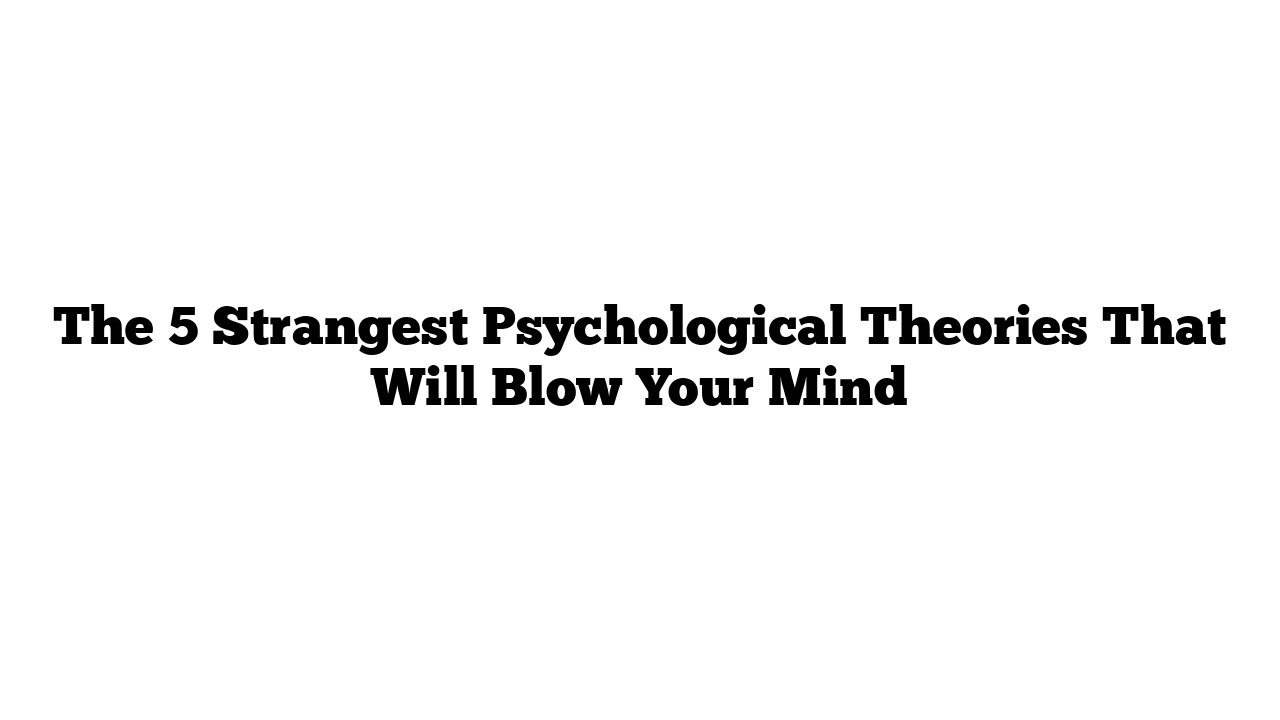Understanding human behavior is a complex task. From madness to consciousness, the human mind has baffled scientists for centuries. While some theories offer valuable insights, others are downright bizarre, walking the fine line between creativity and pseudoscience.
Here’s a dive into five of the strangest psychological theories ever proposed—some debunked, some controversial, and all undeniably fascinating.
1. The Madness Theory: Losing Yourself to Find Yourself
R.D. Laing, a polarizing figure in psychiatry, shook the world with his unconventional view of mental health. While he earned respect for criticizing abusive psychiatric practices, his idea that madness is a self-healing journey stirred controversy.
Laing believed that psychosis wasn’t a condition to be cured but rather a transformational process. He compared it to the spiritual enlightenment many experience during their first psychedelic trip. In his vision, allowing individuals to fully embrace their madness could lead to profound self-discovery.
To test this, Laing set up a house for individuals with schizophrenia, where they could experience their psychotic episodes freely. Stories from this experiment were shocking, like Mary Barnes, who regressed into infancy, smeared feces on walls, and ultimately found her passion for painting. Unfortunately, the experiment ended in tragedy when two participants jumped from the roof, forcing the closure of Laing’s facility.
While intriguing, this theory raises serious concerns about safety and ethics in mental health treatment.
2. Genetic Sexual Attraction: Love at First DNA
The concept of genetic sexual attraction (GSA) turns the universally taboo topic of incest on its head. According to this theory, when close genetic relatives meet for the first time as adults, they can experience overwhelming sexual attraction.
GSA gained attention through cases like Barbara Gonyo, who fell in love with her long-lost adopted son after meeting him as an adult. However, her son didn’t reciprocate her feelings, which highlights the inconsistency of this theory.
Despite its notoriety, GSA remains unproven. There’s no scientific evidence linking genetic similarity and attraction. The idea is more anecdotal than factual, but it continues to spark debate about human relationships and social norms.
3. The Bicameral Mind Hypothesis: Were Ancient Humans Conscious?
Julian Jaynes proposed one of the most intriguing theories about human consciousness: he argued that introspection is a relatively new development in our evolutionary timeline. Jaynes suggested that ancient humans, like those from the era of Homer’s Iliad, lacked true self-awareness.
Instead, their two brain hemispheres functioned independently. Inner thoughts from the left hemisphere were perceived as auditory hallucinations in the right hemisphere, interpreted as the voices of gods. This explains why characters in ancient literature often “hear” divine commands rather than introspect.
While this hypothesis is fascinating, it’s challenging to prove. It has sparked debates among neuroscientists and historians alike, offering a unique perspective on how consciousness evolved.
4. The Mushroom Theory: Magic Mushrooms Made Us Smarter
Terence McKenna’s theory on human evolution is both imaginative and… odd. He proposed that our ancestors’ consumption of psychedelic mushrooms found in cow dung was the catalyst for significant cognitive advancements.
According to McKenna, low doses of psilocybin improved visual acuity, aiding hunting, while higher doses fostered group bonding and triggered language development. In his view, these mushrooms played a pivotal role in shaping human intelligence.
Despite its creativity, the theory lacks evidence. Critics dismiss it as speculative at best, but it remains a popular talking point among those exploring the intersection of psychedelics and human evolution.
5. Wilhelm Reich’s Orgone Energy: Cosmic Healing or Pure Pseudoscience?
Wilhelm Reich, once a protégé of Freud, took psychodynamic theory into uncharted (and controversial) territory. Reich believed in a universal energy called orgone, which he claimed was the essence of life and libido.
Reich constructed orgone accumulators—box-like structures designed to harness this cosmic energy. Patients would sit naked inside the boxes to “absorb” orgone and supposedly cure mental illnesses like schizophrenia or depression. He even used “orgone guns” to shoot down UFOs.
Though captivating, Reich’s theories were dismissed as pseudoscience. The U.S. government banned his devices, and he faced significant legal and professional backlash.
What Can We Learn From These Theories?
These theories, though unconventional, underscore the creativity and curiosity required to explore the complexities of the human mind. While many have been discredited, they remind us that progress often comes from questioning norms—even when the answers seem outlandish.
For more articles on psychology and mental health, visit medicaltimes.io.
Top 10 FAQs on Psychological Theories
- What is the purpose of psychological theories?
Psychological theories aim to explain behaviors, mental processes, and human interactions, often providing a foundation for treatments or further research. - Are R.D. Laing’s ideas still used today?
While his critiques of psychiatric institutions remain influential, his Madness Theory is largely dismissed due to safety concerns. - Is genetic sexual attraction common?
No, GSA is rare and mostly anecdotal, with no concrete scientific evidence to support it. - Did ancient humans really lack consciousness?
Julian Jaynes’ theory is speculative but offers a unique perspective on how introspection may have evolved. - What are psilocybin mushrooms?
Psilocybin mushrooms are fungi containing psychedelic compounds, often linked to altered states of consciousness. - Why was Wilhelm Reich’s work controversial?
Reich’s theories about orgone energy lacked empirical support and were seen as pseudoscientific, leading to his professional downfall. - Are any of these theories still studied?
Some, like the Bicameral Mind Hypothesis, are discussed in academic circles but remain unproven. - What is the role of creativity in psychology?
Creativity helps researchers explore new perspectives, though empirical evidence is crucial for validation. - Did psychedelic substances influence human evolution?
There’s no definitive evidence, but theories like McKenna’s suggest potential connections. - Where can I learn more about psychological theories?
Explore trusted resources like medicaltimes.io, academic journals, and university websites for accurate information.
